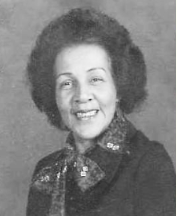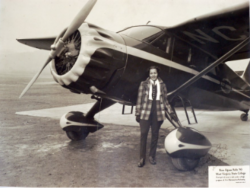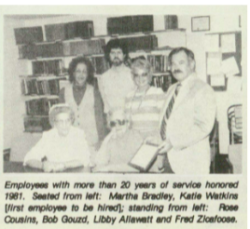Our Diverse Heritage: Marion’s Black History Part 13
Celebrating Black History Month in Marion County
February 16, 2024
Part 13: Rose Agnes Cousins: Pilot to Practitioner
Rose Rolls Cousins graduated from Dunbar and West Virginia State College, where she was a member of the Civilian Pilot Training Program (CPTP). There she became the first African American woman to receive her license from that program. After graduating with a business degree in 1940, Rose eventually taught mathematics at Dunbar until it closed in the mid-1950s.
She changed her career from education to business management. In the late 1950s, M.H. Ross hired her to be his executive assistant as a new multi-specialty health center was planned for Fairmont. It was non-profit and organized to serve UMWA beneficiaries in a pre-payment structure. At the time, there were limited executive assistant positions for women of color, but Rose brought more than office skills to the table and a degree. The organization of this clinic met many hurdles, and Ross could not have achieved the strategy and vision without a capable manager to handle details of the operations.
The organization grew from a small office to larger Fairmont locations, with three satellite operations. With a number of medical specialists and a high volume of patients, Rose eventually moved to oversight of medical records as the need for managing a complex system was a priority for the growing health center. Medical and demographic information were more commonly used by the 1960s with expanded insurances, industry HMOs (such as the UMWA Health Plan) as the key factors of reimbursement. As these systems grew, the effective health system had to ‘grow’ and adapt a business and record system manually unlike today. Rose Cousins spearheaded this effort, and it was always ahead of the curve.
By the late 1960s, she evolved this into a highly sophisticated medical record system that included physician dictation, diagnostic results, and other communication. The records were compendium of health services, organized by content area and digitally filed. A system of encounter billings were documented using medical notes as well as daily visit coordination. Rose became an innovative records administrator ahead of the curve before health information exchange became a key functional area of health organizations by the mid-1980s. She earned a registered record technician credential. Privacy laws today have the same rules as Rose Cousins did back then: uphold ethics, confidentiality, respect for privacy and proper oversight of information. However, her management of sophisticated record keeping also had an impact of the ability of the nonprofit organization to receive federal funding for studies in the early 1970s. Outcome data could be retrieved and demonstrated. Feasibility studies were funded on preventive medicine, capitation systems, and family-centered care. A groundbreaking HMO feasibility study lead to the first ‘Unicare’ program in the late 1970s and early 1980s based on prevention and primary care case management.
Throughout the 1970s and 1980s, Rose Cousins’ medical records were comprehensive and thus aided many area coal miners’ state and federal black lung claims. She knew the technical requirements and medical diagnoses required, and, helped case manage these claims especially by working closely with the UMWA District 31 Compensation Office. She played an instrumental role in processing medical information needed for risk management/safety way ahead of its time. She was an early mentor of mine, and I learned a great deal.
Rose was always respected in her field and also was instrumental in planning early medical record technician programs at Fairmont State/Fairmont Community College. She retired from MVA in 1999 with over 40 years of service. She died in July 2006.



